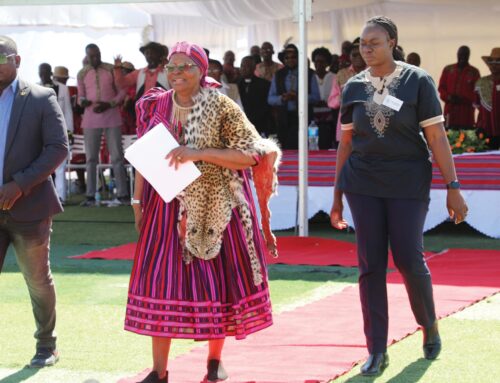In 2017 the United Nations General Assembly designated 27 June as the day in the calendar year on which to recognise the vital role played by micro, small and medium enterprises (MSMEs) in the economy.
While it did not come as a surprise, recognising the important wealth and job creation role of MSMEs globally was widely considered long overdue. The view held by many is that the informal sector and MSMEs have been ignored for too long and their important contribution somewhat overlooked. Surely the informal and MSME sector’s contributing role at grassroots level in local communities should be acknowledged throughout the year, some would feel, and not only on one day.
This bodes the question: does the sector get enough recognition here in Namibia and what does the future hold for the country’s MSME sector? To address this vexed question, let us take a closer look at the sector’s role and its importance to our country.

The entrepreneurial journey for most will start by identifying a need in their local community. They then garner their resources, often with the help of the three Fs – family, friends and fools – to fulfil or satisfy that need. The emerging entrepreneur takes the risk by venturing into business in the hope that there will be a reward, but soon most will discover that a business endeavour is a learning experience. Inevitably, novice entrepreneurs will learn the hard way that an unwillingness to work hard and smart will result in failure.
Namibia’s business environment – like most of the other countries on the African continent – can sometimes be rather business-unfriendly and not always conducive for enterprises in general, and more specifically the MSME sector, to thrive.
THE ROLE AND IMPORTANCE OF MSMES IN NAMIBIA’S ECONOMY
In this geographically vast country, the absence of MSME enterprises operating long hours every day of the week to service customers would be catastrophic. Operating across Namibia, owner-managed micro and small businesses provide much-needed goods, essential daily needs and services to households and other enterprises in townships near cities and to local communities in towns, villages and rural settlements countrywide.
Often the wealth created by a small home-based firm supplements the income of households, but for most Namibians owning a small business, it is their only source of income. As a result, early-stage entrepreneurs have little alternative but to work hard, diligently and in a focused manner from day one to make a success of their business venture.
Measured by job creation, this sector makes the biggest contribution. Empirical evidence shows that in Namibia seven out of every ten income-paying jobs are created by MSMEs.
A compelling question emerges: What drives the emphasis on mobilising foreign direct investment, and how can we ensure a balanced allocation of resources to also empower and nurture grassroots entrepreneurship?
While foreign direct investment undoubtedly brings value, it’s important to acknowledge that the long-term economic well-being of Namibia relies not only on the contribution of the MSME sector in terms of wealth and job creation but also on a combination of vital factors.
Most local conglomerates did not make an overnight or abrupt appearance on the country’s business landscape as a corporate firm with a network of branches and a multitude of business divisions. Their genesis was as small owner-managed enterprises. This is another compelling reason why Namibia must nurture its MSMEs, as it is from this sector that the large enterprises of tomorrow will emerge.
It is common knowledge that entrepreneurship is not an event, but a journey. Most entrepreneurs start their journey as a micro enterprise or as a home-based business operating in the informal sector. Over time these fledgling enterprises migrate to the formal sector and grow to become small and later medium enterprises.
There is no doubt that Namibia’s MSME sector has long served as the nation’s entrepreneurship and enterprise development incubator, and continues to do so. For most Namibians a job with a small local enterprise provides their first paid work experience. Working for a small business helps the newcomer to the job market to gain essential work skills, knowledge and expertise. Over time it positions that individual better to secure higher-paid employment with larger firms. Sadly, all too often this important developmental role of Namibia’s MSME sector goes unrecognised.
CREATING A BUSINESS-FRIENDLY ENVIRONMENT FOR THE MSME SECTOR
As local entrepreneurs will attest, doing business in Namibia is not always a walk in the park. Challenges are rife, and it takes guts to persevere and not throw in the towel. Creating a conducive environment in which business can grow and thrive starts with business-friendly officialdom, the cutting of bureaucratic red tape and scrapping of the plethora of growth-inhibiting business rules and regulations.
But change must not only come from the public sector. It is high time that banks, lenders, insurers and other providers of business and financial services view small owner-managed and family-run enterprises as their big clients of tomorrow.
Furthermore, standard copy-and-paste financial and related business services should be replaced by creative and Namibia-specific business start-up and growth funding, banking and insurance service offerings.
THE FUTURE OF NAMIBIA’S MSME SECTOR FOR THE ECONOMY
MSMEs operate in a variety of sectors, but many business opportunities remain unexplored and ripe for the picking. These include manufacturing, agri-processing, hospitality and tourism, transportation and logistics, meat and food processing, renewable energy, waste recycling and an array of other services. Our entrepreneurs and MSMEs should be encouraged and enabled to rise to the challenge and tap into these opportunities.
Politicians and decision-makers in the public sector seem to have realised that it is entrepreneurs who create wealth and jobs, not the government. There is welcome acknowledgement that the government’s role is to create an enabling environment in which a business can be started or positioned to grow with administrative ease.
Namibia’s economy is set for accelerated growth once words are turned into actions.






